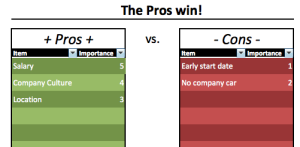Last week, I experienced crazy deja vu when I helped with my company’s on-campus recruiting on Miami University’s campus.
The deja vu feeling hit me after I parked in the same spot, walked through the same doors, took the same elevator, and sat at the same table exactly one year ago. But, instead of being a senior with a big job interview, this time I was on the company side and greeting the candidates before their interviews.
I felt even weirder when a career services’ employee walked by me and said, “Good luck on your interview today,” probably because of my suit and young look. Time doesn’t wait for anyone, that’s for sure.
Anyway, besides my deja vu experience, I small-talked with candidates for about five minutes before a manager picked them up for their interview. During these short conversations where candidates asked about my outside sales position and company, I tried to observe everything about these applicants.
For one, I wanted to have an opinion if my managers asked my thoughts about a certain candidate. And I knew a blog post would come out of my observations, so here it is.
What Stood Out In My Observations
I noticed right away that almost all the applicants fell into one of two different categories: either the extremely talkative group who rattled off question after question to me, or the quiet group who barely spoke to me and only when they were asked a question.
Second, many of the brief conversations I had were pretty fake with fluffy answers that the applicants thought I wanted to hear, instead of their honest answer. That didn’t show too well on some candidates, from my perspective.
Also, the faces and body language of the candidates showed signs of being nervous. These nerves had applicants fidgeting with their portfolio, tapping their foot, or randomly checking their cell every 10 seconds. I’m not a body language expert (I have only read one book on the subject), but if I could see these nerves as a greeter, then I’m sure the interviewers could, too.
And my last observation is that many applicants didn’t seem to realize the evaluation process starts the moment they meet a person from the organization, in this case me at the table. They put their best foot forward and got professional when the interviewer picked them up, but some were lacking enthusiasm beforehand.
Based on these four observations above, these applicants could use some related tips for job interviews.
Tips For Job Interviews
Don’t get me wrong, some candidates were extremely poised and sharp. However, it’s easier to learn from those who made mistakes. So based on my four observations, here are some quick tips for job interviews:
- Treat all pre-interview and post-interview conversations like a normal conversation, where you balance speaking 50 percent of the time and listening the other 50 percent. Show your social skills and personality by engaging the secretary, greeter, or whoever you speak to at the organization in a friendly way. Personality goes a long way in recruiting because organizations don’t want jerks—no matter how talented—who can’t work with anyone.
- Give your honest opinion when interviewers ask you personal questions. If you’re asked, “Why do you want this position” or “What motivates you,” then don’t give a fluffy answer that you think sounds good. Be straight up in your answers, like you want this position because it allows you to compete every day and beat your peers and you’re motivated by money. You’ll be more impressive and a breath of fresh-air compared to all the fake answers the interviewers hear.
- The best way to appear confident during your job search is to be confident. Having a successful resume and stories prepared for interview answers will relieve you of feeling nervous. Positive self-talk will also help you display confidence.
- Realize that the moment you enter the organization’s parking lot for your interview, everything you say and do can be used for you or against you. So, treat the janitor or secretary as well as you would the interviewer. And tell yourself the show starts now and you can relax once you’re gone.
Like this post? Take your job search to the next level with my Amazon bestselling book The Golden Resume.
Readers, what aspect of the job search do you worry about the most? Why do you think many candidates answer interview questions with what they think the employer wants to hear? Feel free to comment any other thoughts you have on this topic.



